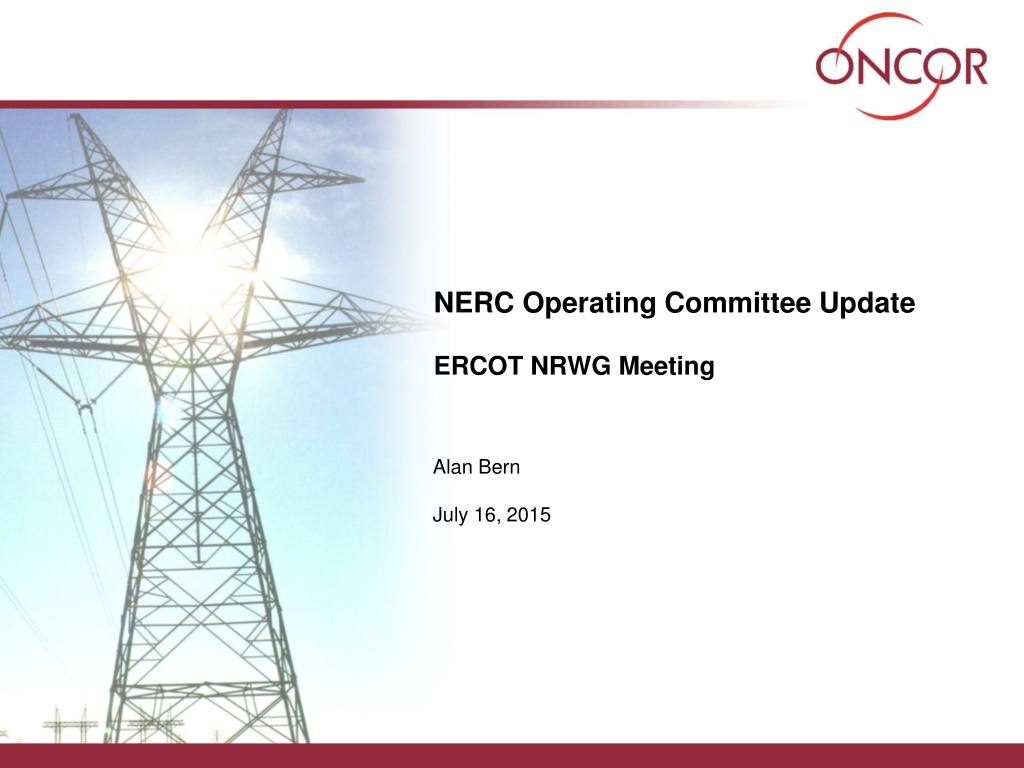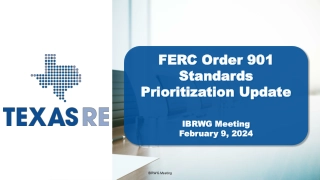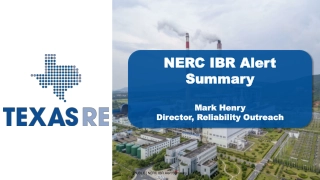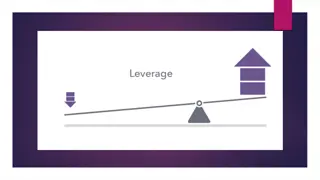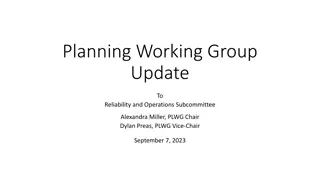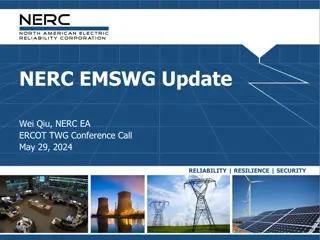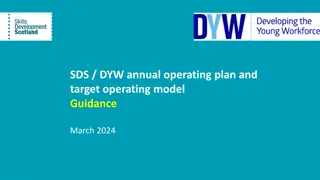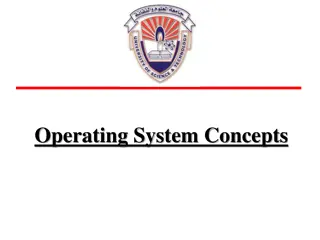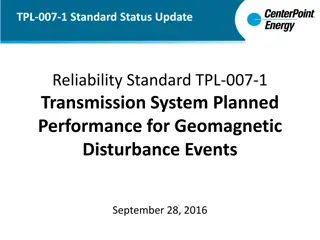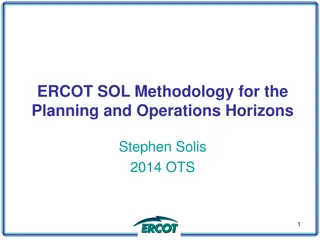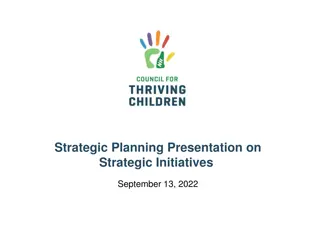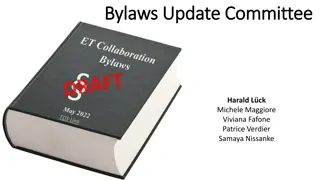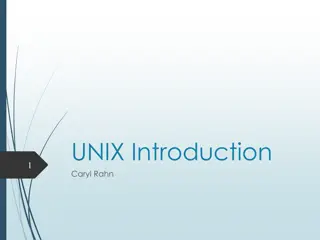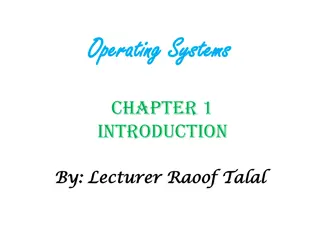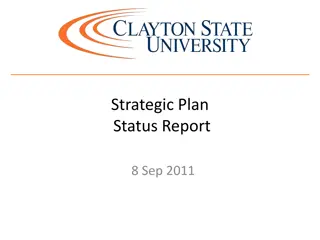NERC Operating Committee Update & Strategic Plan Overview
The NERC Operating Committee (OC) oversees critical operational reliability matters within the electricity sector, aligning with the organization's strategic plan for the next five years. Led by Chair Jim Case and Vice-chair Lloyd Linke, the OC collaborates with various stakeholders, focusing on emergent issues impacting Bulk Electric System (BES) reliability. The OC's strategic plan emphasizes coordination, excellence in event analysis, maintenance of reliability standards, and expertise enhancement to ensure high levels of operational reliability. Through active participation, issue assessment, and industry communication, the OC aims to address evolving challenges within the interconnected grid efficiently.
Uploaded on Sep 19, 2024 | 0 Views
Download Presentation

Please find below an Image/Link to download the presentation.
The content on the website is provided AS IS for your information and personal use only. It may not be sold, licensed, or shared on other websites without obtaining consent from the author. Download presentation by click this link. If you encounter any issues during the download, it is possible that the publisher has removed the file from their server.
E N D
Presentation Transcript
NERC Operating Committee Update ERCOT NRWG Meeting Alan Bern July 16, 2015
NERC Standing Committees Operating Committee (OC) Planning Committee (PC) Compliance & Certification Committee (CCC) Critical Infrastructure Protections Committee (CIPC) Reliability Issues Steering Committee (RISC)
OC Members Chair (Jim Case) and Vice-chair (Lloyd Linke) RE representatives (Alan Bern Texas RE Representative) Cooperatives Electricity Marketer Federal/Provincial State Government Investor Owned Utility ISO-RTO Large End-use Electricity Customer Merchant Electricity Generator Small End-Use Electricity Customer State/Municipal Transmission Dependent Utility All members are on two year terms and are voted into membership
NERC OC Strategic Plan (Five Years) Purpose The purpose of NERC OC s Strategic Plan is to establish strategic direction for the NERC OC, in conjunction with the ERO s vision. The Plan seeks to focus the OC onto operational reliability matters and outlines the Guiding Principles under which the NERC OC will operate over the next five years. Guiding Principles Coordinate with the Reliability Issues Steering Committee (RISC) identified priorities and align the OC strategic plan with ERO s strategic plan. Continually strive for excellence in event analysis (EA), emerging cause code trending and information sharing. Maintain the structure, processes and relationships with other NERC standing committees, and foster relationships with other forums, to achieve high levels of reliability for the BES. Maintain and enhance reliability through the pursuit of clear NERC Reliability Standards, reliability guidelines, NERC Alerts, interpretations, lessons learned, and other operational compliance clarifications. Maintain high levels of expertise to provide sound conclusions and opinions on operational issues.
Goal OC 1 To investigate emergent issues impacting the reliability of the BES. Action Plan OC 1 The OC will actively participate, recommend emergent operating issues, and help establish the priorities to RISC, while engaging with the appropriate parties to develop the necessary mitigation process. The OC will review the issues at each standing committee meeting for status and progress and re- prioritize (as necessary). The OC will assess and inform the industry on the evolving reliability impacts of the continuous changes in the topology of the Interconnection. The OC will continue to identify operating challenges, reliability impacts, and operating trends associated with generation and demand-side resource changes. The OC will continue to assess and inform the industry on the reliability impacts of natural gas/electric generation interdependences. The OC will assess and inform the industry on the evolving reliability impacts of the fundamental changes to interconnected operations, such as changes to the footprints of reliability coordinators, balancing authorities, transmission operators, Interconnections, and HVDC ties, etc. The OC will assess and inform the industry on the reliability impacts from possible high-impact, low- frequency events that could have unacceptable operational consequences on the BES.
Goal OC 2 Utilize the results of the Event Analysis Process to improve the reliable operation of the BES. Accomplishing this goal requires a two-pronged approach. First, the OC will focus on event prevention by providing industry with information associated with good industry practices and emerging tools, technology and techniques. Hence, information can be shared with the intended benefit of avoiding events. Second, the OC will continue to champion and enhance the EA program and use it to rapidly disseminate lessons learned, from which industry may profit through enhanced operational reliability. Action Plan OC 2 The OC will assure the Events Analysis Subcommittee (EAS) is staffed with technical leaders allowing EAS to inform the industry of good industry practices as well as emerging trends identified through the EA process. Through emerging lessons learned, the EAS may recommend: Development of reliability guidelines Development of NERC Alerts Improvements to existing Reliability Standards New Reliability Standards The EAS will present root causes and lessons learned at OC meetings with the objective of sharing information on industry improvement opportunities. The EAS will manage the dissemination of information such as lessons learned and good industry practices. The EAS will leverage industry groups (such as the North American Transmission Forum and Generation Forum) in the development of quality lessons learned. The EAS, in coordination with the Personnel Subcommittee, will recommend training and education as a result of lessons learned and emerging cause code trends. The EAS will annually survey the Regional Entities to determine if recommendations associated with lessons learned are being implemented and if not why. The EAS will report the survey results to the OC. The OC will encourage the use of lessons learned by continuing to inform the industry of current and past lessons learned, through the use of NERC news letter, and other open forms of communications (such as industry webinars and reliability guidelines).
Goal OC 3 The OC will be proactive in the review of the proposed Reliability Standards under development or improvement. Action Plan OC 3 The OC will: Review, discuss, and develop recommendations for the standard development teams Recommend to Standards Committee revisions to standards or the retirement of existing standards as appropriate Encourage appropriate OC involvement in the informal standards development process Prepare responses to requests for interpretations Establish and maintain a method for active management of field trials associated with standards development, including the leadership of the field trial (as necessary).
Goal OC 4 Improve the depth of NERC reports to include operations perspectives. The OC will be proactively engaged in the development of NERC reports by assigning subcommittees or appointing representatives to groups in which operations reliability perspectives will be beneficial. Key findings and recommendations within NERC reports serve as the technical basis for NERC Reliability Standards, project prioritization, compliance improvement, assessments, and critical infrastructure protection, as well as a roadmap into the future. By providing early input into NERC efforts, the OC can provide a valuable service to the industry, as well as support NERC in addressing its top priorities. Action Plan OC 4 The OC will direct the Resources Subcommittee to coordinate with the NERC Performance Analysis Subcommittee to provide seasonal reports that include operational risk analyses, assessments, metrics, and risk evaluation associated with frequency including post analysis of most recent operating season. The OC will direct the Operating Reliability Subcommittee to coordinate with the NERC Reliability Assessment Subcommittee to provide seasonal reports that include operational risk analyses and evaluation. The OC will review and endorse NERC s annual State of Reliability report. The OC will assure OC representation, and will collaborate, with the appropriate subgroups on issues such as: Reliability metrics Operational Security Interconnection frequency response Performance analysis Essential Reliability Services
Reports State of Reliability Report AC Substation Equipment Task Force Report Integration of Variable Generation Task Force Report Essential Reliability Services Report Simplify the ERS message and make it less technical for policymakers, but keep the technical language for justification. Aggressive schedule to complete for OC review by December 2015. ERCOT input
Reliability Guidelines Generating Unit Operations During Complete Loss of Communications Issued for comments and approved GOs unhappy with confusion OC re-wrote and issued for comments a second time Approved Key is that GOs should work with their RCs and use recommendation or develop plan that meets their needs.
Field Tests: BAL-002-2 Conclusions The BAAL Requirement focuses on Frequency Control for the Interconnection The correlation between CPS1 and BAAL always drives corrective actions to support frequency The BAAL is a proportional allocation of responsibility across all BAs. BAAL captures all conditions that impact frequency The SDT believes the BAAL time duration of 30 consecutive clock minutes has proven to be appropriate The SDT believes the BAAL Field Trial results validate the FTLs at 3 times Epsilon 1 The BAAL design does not appear to have any effect on NERC Inadvertent Interchange The BAAL design does not appear to have any effect on congestion management/unscheduled flow within the WI The BAAL does not appear to have an adverse impact on Frequency Error Recommendation Continue the Field Trial until BAL-001-2 becomes effective Encourage additional BA participation Next Steps Provide the preliminary Field Trial Report to the NERC OC
Presentations EAP Lessons Learned Cognitive Overload: Putting more and more on system operators. Need to emphasize not adding tasks to real-time operators. Information overload Westar Energy Lesson Learned: Generator trip lead to complete loss of power to plant due to inadequate handling of emergent work Toronto Blackout on July 8, 2013 Storms and flooding lead to loss of AC station service, communications, mechanical/pneumatic equipment issues and eventually to voltage reduction and rolling blackouts. Hydro Quebec Summer 2013 Severe drought, forest fires and abnormally closed breaker led to fault that lasted 4:21 minutes followed by another fault that lasted 2:05 minutes. Loss of 3,950 MW of internal load, Tripped 5 HVDCs ties (3,200 MW), tripped 12 SVCs and 1 SC, Tripped 4 735kV lines (overvoltage protection) Situational awareness, communicate with other entities, magnitude of fires, maintenance protection procedures. New York ISO winter 2013 2014 Electric / Gas Coordination
Presentations Continued Risk Based Registration 2014 Polar Vortex Report Update GridEx III 2014 Long-Term Reliability Assessment Key Finding #1: Reserve Margin Projections Are Declining in Several Assessment Areas across North America Key Finding #2: Environmental Regulations Pose New Uncertainties for System Planners and Require Further Assessment Key Finding #3: A Rapidly Changing Resource Mix Highlights the Need for New Approaches to Assess Reliability RRM Dashboard Lessons learned by RE, event analysis categories by RE, NERC Alerts issued, DOE WWSIS 3: Western Frequency Response and Transient Stability Study FAC-003 Research Project: Overview of Validation Testing of Minimum Vegetation Clearance Distances Standards Under Development CIP-014-1 Update, TOP/IRO Reliability Standards Update, PRCs Update
December 9-10 NERC Operating Committee Meeting Texas RE Update Approved the revised Reliability Guideline: Generating Unit Operations during Complete Loss of Communications for a 45-day comment period. Approved the new Reliability Guideline: Reliability Coordinators / Balancing Authorities / Transmission Operators Communication: Loss of Real-time Reliability Tool Capability / Loss of Equipment Significantly Affecting ICCP Data for 45-day comment period. Endorsed the ACSETG (AC Substation Equipment Task Force) final report Subject to recommendations being refined into actionable business plan with defined priorities for implementation purposes. Endorsed the initial draft of the ERSTF (Emergency Response Services Task Force) Phase 2 document and requirement added to include a proof of concept associated with the four measures and a detailed project schedule and timeline. 2015 2019 NERC OC Strategic Plan review and update led by Alan Bern
You could be the next Texas RE representative on the NERC Operating Committee! Elections will be held next year for June 2016 June 2018 term.
